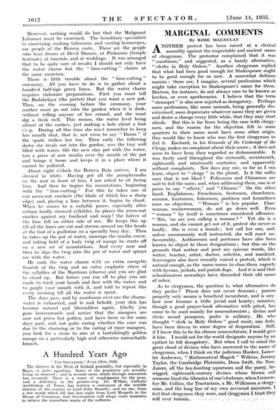MARGINAL COMMENTS
By ROSE MACAULAY
ANOTHER protest has been raised at a clerical assembly against the respectable and ancient name of clergyman. The protestor complained that, it was " cumbrous," and suggested, as a handy alternative, " clerks in Holy Orders." Another clergyman replied that what had been good enough for Shakespeare ought to be good enough for us now. A somewhat dubious maxim : there are,- I imagine, several professions which might take exception to Shakespeare's name for them. Doctors, for instance, do not always care to be known as leeches, or even apothecaries. I believe that the term " strumpet " is also now rejected as derogatory. Perhaps some professions, like some animals, being generally dis- esteemed, soon depreciate whatever name they are given and desire a change every little while, that they may start afresh. But this is far from being the case with clergy- men, and the reason for the objection felt in some quarters to their name must have some other origin. One would like to know who was the first clergyman to feel it. Eachard, in his Grounds of the Contempt of the Clergy, makes no complaint about their name ; it does not seem to have been then regarded as dishonourable. It was freely used throughout the sixteenth, seventeenth, eighteenth and nineteenth centuries, and apparently without complaints. Nor does any one, so far as I can learn, object to " clergy " in the plural. Is it the suffix man that is not liked ? Policemen and Chinamen are said to feel the same, and, when addressing these, one is at pains to say " officer," and " Chinese." On the other hand, Englishmen, Frenchmen, Scotsmen, churchmen, seamen, huntsmen, fishermen, postmen and kennelmen raise no objection. " Woman " is less popular. Char- woman, washerwoman, do not go down well. Even " woman " by itself is sometimes considered offensive. " 'Ere, 'oo are you calling a woman ? " Yet she is a woman, and she cannot get out of it, protest she never so loudly. She is even a female ; but call her one, and, unless uncommonly well instructed, she will react un- favourably. Authoresses and poetesses have also been known to object to these designations ; but this on the grounds that author and poet are epicene words, like writer, teacher, artist, doctor, solicitor, and mankind'. Scavengers also have recently voiced a protest, 'which is natural enough, as the nine seems to class them vaguely with hyenas, jackals, and pariah dogs. And it is said that schoolmasters nowadays have discarded their 'old name of usher.
As to clergymen, the, question is, what alternative do they prefer ? Priest does not cover deacons ; parson properly only means a beneficed incumbent, and is any- how now become a trifle jovial and hearty; minister, though a good prayer-book alternative with priest, has come to be used mainly for nonconformists ; divine and cleric sound pompous, padre is military. He who thought " clerk in Holy Orders " good' must, one feels, have been driven to some degree of desperation:. Still, if I knew this to be his chosen nomenclature, I would give it him. I would not for the world designate anyone by an epithet he felt derogatory. But when I call to mind the great cloud of divines who have answered to the name of clergyman, when I think on the judicious Hooker, Lance- lot Andrewes, " Mathematical Magick " Wilkins, Jeremy Taylor, the Cambridge Platonists, Dean Swift,- the Non- Jurors, all the fox-hunting squarsons and the pursy, wigged, eighteenth-century divines whose brown calf sermons lined the libraries of one's forbears, when 'remem- ber Mr. Collins, the Tractazians, a Mr. Wilkinson &clergy- man, and the long line of my own reverend ancestors, I feel that clergymen they were, and clergymen I trust they will ever remain.


















































 Previous page
Previous page